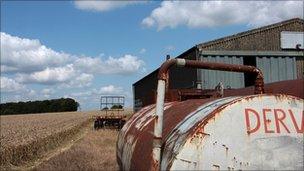Farmers' wives in Wales urged to foster
- Published

Farms can offer children a life 'away from chaos'
Farmers' wives are being targeted to combat shortages in foster families across Wales.
The number of foster families is said to have hit "critically low levels".
Foster agencies are now looking to recruit more farmers' wives, as they provide a "tranquil" environment, and "get them away from the rat race and chaos" of city living.
But councils stressed they would continue to accept applications from people of "any walk of life".
More than 750 extra foster families are needed in south and west Wales alone.
Jackie, 61, and Alec, 62, have fostered more than 40 children over 20 years. They currently have four children, aged between eight and 17, living with them on their 26-acre farm in Lampeter, Ceredigion.
"We've been married for 43 years, have two grown-up children of our own and we have five grandchildren," said Jackie.
"When our children had left home, we decided to foster. Our application took about 18 months to go through. Then one evening this car pulled up and two half-asleep little boys got out.
"They were supposed to be staying with us for a week - three years down the line they were still here and their little brother had joined us as well.
"Eventually, they all went back to their mum, which shows that sometimes there are happy endings."
Jackie added: "Their lives are chaotic in big cities. When they're out here they are away from everything really.
"It's a lovely environment for them. They can ride horses, feed lambs, go fishing, camping - but we make sure they are supervised, they don't just go wandering off.
Sense of humour
"There are also health benefits. They eat our vegetables from the farm and they get the fresh air and get to play outside.
"Foster parents need a sense of humour, patience, understanding, empathy and to just give lots of love really.
"It's nice being able to help these children - it's enlightened our lives. I would recommend it to anyone."
A spokesman for Fostering Network Wales said there was an "urgent need" for more people to come forward to foster, but it was essential they had the right skills and qualities to look after someone else's child.
"Fostering services will be looking for those farming families that can provide children with a safe, stable and secure home and are committed to providing the best possible care," he said.
"For some children, living on a farm could certainly provide a positive environment while they are unable to live with their own family."
Barrie Lewis, regional recruitment manager for Pathway Care, an independent agency which finds fostering placements for children in local authorities across south and west Wales, said: "The shortage at the moment is high when you think how many people can actually foster.
"Out of every 10 queries, we tend to find only one suitable carer.
"We've got a lot of foster families on working farms in west Wales. I'd say we have roughly 25.
"It gets children away from chaos, living in large, busy, hectic households on council estates where there aren't great opportunities."
He said on farms, children had the chance to do more outdoor activities and have more involvement in country life.
"It's also good to see how other people make a living through farming. It gives them an opportunity to come out of the rat race they're in," he said.
"Where else would they be able to go riding horses, feeding lambs and taking animals to market?
"Being in the countryside is particularly good for children who have suffered trauma - it gives them tranquillity and they get a lot more attention because farmers' wives spend more time at home."